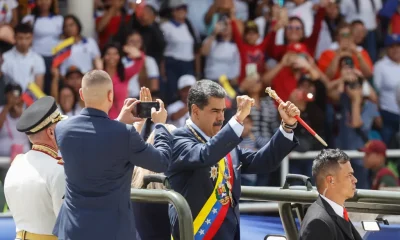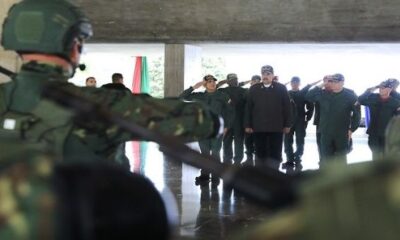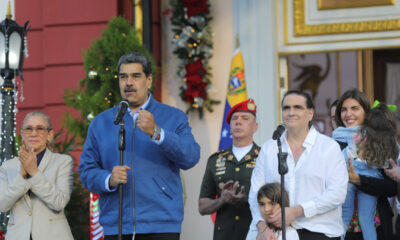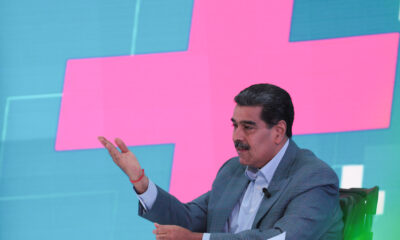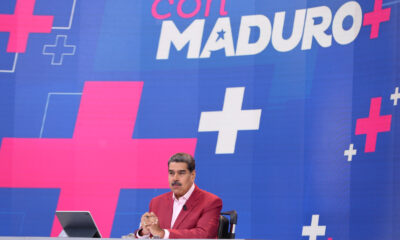International
Venezuelan President: we had a great triumph of diplomacy for peace
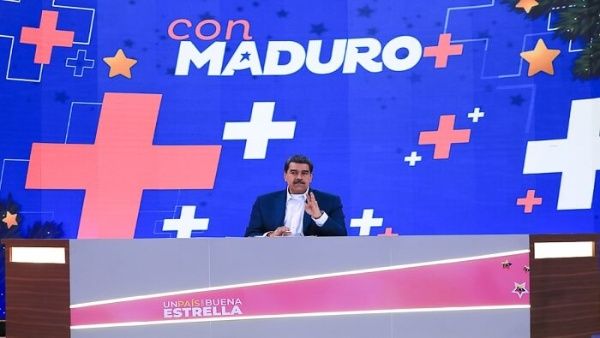
December 19 |
The president of Venezuela, Nicolás Maduro, highlighted on Monday that “we had a great triumph of diplomacy for peace” on the direct dialogue held with Guyana on the territorial dispute over the Guayana Esequiba.
During his program Con Maduro +, the head of state thanked the Community of Latin American and Caribbean States (Celac) and the Caribbean Community (Caricom), as well as the other authorities that made possible “that historic meeting, face to face, where we brought the documented truth of Venezuela”.
“There was no truth from Venezuela about our historical rights that we did not bring to the table there, and I think we had a great triumph of diplomacy for peace, of diplomacy to advance in the rescue of our historical rights,” the president stressed.
In addition, he spoke of the declaration presented after the high-level dialogue held, last December 14, in Saint Vincent and the Grenadines between the delegations of Venezuela and Guyana, indicating that it should be known by all.
“If we achieved something with the campaign and the debate for the referendum, it was that millions of Venezuelan men and women became aware of the issue of the historical claim over our Essequibo; 150 years of struggle and today we have put the issue of the Essequibo in the first place of priority so that, once and for all, Venezuela recovers its historical rights”, he emphasized.
Likewise, he recalled that in the last consultative referendum the people spoke and “we have to respect the mandate of December 3, and move forward through diplomacy, move forward through the legal struggle, the political struggle, move forward with great strength so that, sooner rather than later, Venezuela may have the historic achievement of fully recovering its rights over the Essequiba Guiana. Essequiba Guyana belongs to Venezuela”.
President Maduro thanked again those who made possible the direct dialogue with Guyana and, particularly, he spoke of the role played by his Brazilian counterpart, Luiz Inácio Lula da Silva, for “understanding, for peace, and so that US imperialism does not wage a war as they want with the Southern Command here in the Caribbean, here in South America. I think it has been a step forward and it is the first impact” of the December 3 referendum.
Rejection to the interference in the controversy over the Essequibo
For his part, Venezuelan Foreign Minister Yván Gil previously rejected, through his account on the social network X (formerly Twitter), the interference of the United Kingdom in the territorial controversy with Guyana over the Essequibo.
“The ex-empire, invader and slaver, which illegally occupied the territory of the Essequiba Guiana and acted in an artful and crawling manner against the interests of Venezuela, insists on intervening in a territorial controversy that they themselves generated”, declared the Foreign Minister, in reference to the visit to Guyana of the United Kingdom Undersecretary of State for the Americas and the Caribbean, David Rutley.
Foreign Minister Gil asserted that the only valid action of the United Kingdom will be the recognition “of its responsibility before international law and the obligations derived from the Geneva Agreement of 1966”.
Then, following a message issued by UK Foreign Secretary David Cameron on Rutley’s visit, the Venezuelan Foreign Minister urged him to “instead of sending ridiculous messages of intrigue, take charge, with true honor, of the commitments assumed in 1966”.
“In that task we have committed ourselves to Guyana and Venezuela, in order to reverse one of the effects of colonialism and imperial arrogance in our region”, he stressed.
International
U.S. Senate Rejects Budget, Bringing Government Closer to Shutdown Amid DHS Dispute

The U.S. Senate voted on Thursday against a budget proposal in a move aimed at pressuring changes at the Department of Homeland Security (DHS), following the killing of two civilians during a deployment of immigration agents in Minneapolis.
All Senate Democrats and seven Republican lawmakers voted against the bill, which requires 60 votes to advance, pushing the country closer to a partial government shutdown that would cut funding for several agencies, including the Pentagon and the Department of Health.
The rejection came as Senate leaders and the White House continue negotiations on a separate funding package for DHS that would allow reforms to the agency. Proposed measures include banning Immigration and Customs Enforcement (ICE) agents from wearing face coverings and requiring them to use body-worn cameras during operations.
The vote took place just hours after President Donald Trump said he was “close” to reaching an agreement with Democrats and did not believe the federal government would face another shutdown, following last year’s record stoppage.
“I don’t think the Democrats want a shutdown either, so we’ll work in a bipartisan way to avoid it. Hopefully, there will be no government shutdown. We’re working on that right now,” Trump said during a Cabinet meeting at the White House.
International
Trump Says Putin Agreed to One-Week Halt in Attacks on Ukraine Amid Extreme Cold

U.S. President Donald Trump said on Thursday that he secured a commitment from Russian President Vladimir Putinto halt attacks against Ukraine for one week, citing extreme weather conditions affecting the region.
“Because of the extreme cold (…) I personally asked Putin not to attack Kyiv or other cities and towns for a week. And he agreed. He was very pleasant,” Trump said during a Cabinet meeting broadcast by the White House.
Trump acknowledged that several advisers had questioned the decision to make the call.
“A lot of people told me not to waste the call because they wouldn’t agree. And he accepted. And we’re very happy they did, because they don’t need missiles hitting their towns and cities,” the president said.
According to Trump, Ukrainian authorities reacted with surprise to the announcement but welcomed the possibility of a temporary ceasefire.
“It’s extraordinarily cold, record cold (…) They say they’ve never experienced cold like this,” he added.
Ukrainian President Volodymyr Zelensky later commented on the announcement, expressing hope that the agreement would be honored.
International
Storm Kristin Kills Five in Portugal, Leaves Nearly 500,000 Without Power

Storm Kristin, which battered Portugal with heavy rain and strong winds early Wednesday, has left at least five people dead, while nearly half a million residents remained without electricity as of Thursday, according to updated figures from authorities.
The revised death toll was confirmed to AFP by a spokesperson for the National Emergency and Civil Protection Authority (ANPEC). On Wednesday, the agency had reported four fatalities.
Meanwhile, E-Redes, the country’s electricity distribution network operator, said that around 450,000 customers were still without power, particularly in central Portugal.
Emergency services responded to approximately 1,500 incidents between midnight and 8:00 a.m. local time on Wednesday, as the storm caused widespread disruptions.
The Portuguese government described Kristin as an “extreme weather event” that inflicted significant damage across several regions of the country. At the height of the storm, as many as 850,000 households and institutions lost electricity during the early hours of Wednesday.
Several municipalities ordered the closure of schools, many of which remained shut on Thursday due to ongoing adverse conditions.
Ricardo Costa, regional deputy commander of the Leiria Fire Brigade, said residents continue to seek assistance as rainfall persists.
“Even though the rain is not extremely intense, it is causing extensive damage to homes,” he noted.
In Figueira da Foz, a coastal city in central Portugal, strong winds toppled a giant Ferris wheel, underscoring the severity of the storm.
-

 Central America5 days ago
Central America5 days agoGuatemala seizes over a ton of cocaine hidden in flour at Pacific port
-

 Central America3 days ago
Central America3 days agoGuatemala Police Arrest Prison Guard Caught in the Act of Extortion
-

 Central America3 days ago
Central America3 days agoHonduras swears in conservative president Asfura after disputed election
-

 International5 days ago
International5 days agoHistoric snowstorm paralyzes Toronto after 60 centimeters of snow
-

 Central America3 days ago
Central America3 days agoBukele leads public trust rankings as UCA survey highlights gains in security
-

 International2 days ago
International2 days agoFootball Fan Killed in Clashes After Colombian League Match
-

 International5 days ago
International5 days agoSpain’s irregular migrant population rises to 840,000, study finds
-

 Central America2 days ago
Central America2 days agoGuatemala President Says Starlink Terminal Found Inside Prison
-

 International3 days ago
International3 days agoDoomsday clock moves to 85 seconds before midnight amid rising global risks
-

 International3 days ago
International3 days agoWinter Storm Fern Leaves 30 Dead and Over One Million Without Power Across the U.S.
-

 Sin categoría3 days ago
Sin categoría3 days agoEight Killed in Series of Armed Attacks in Ecuador’s Manabí Province
-

 International1 day ago
International1 day agoU.S. Senate Rejects Budget, Bringing Government Closer to Shutdown Amid DHS Dispute
-

 International3 days ago
International3 days agoSpain approves plan to regularize up to 500,000 migrants in Historic Shift
-

 International5 days ago
International5 days agoRights group says nearly 6,000 killed in Iran protest crackdown
-

 Sin categoría3 days ago
Sin categoría3 days agoEl Salvador Launches Fourth Year of Ocean Mission to Protect Marine Ecosystems
-

 International2 days ago
International2 days agoRubio Says U.S. Could Participate in Follow-Up Russia-Ukraine Talks
-

 International2 days ago
International2 days agoMissing Spanish Sailor Rescued After 11 Days Adrift in Mediterranean
-

 Central America8 hours ago
Central America8 hours agoPanama Supreme Court Strikes Down Panama Ports Concession as Unconstitutional
-

 International5 days ago
International5 days agoVenezuela frees at least 80 political prisoners, NGO says
-

 International5 days ago
International5 days agoEU launches new probe into X over AI-generated fake nude images
-

 International1 day ago
International1 day agoStorm Kristin Kills Five in Portugal, Leaves Nearly 500,000 Without Power
-

 International1 day ago
International1 day agoTrump Says Putin Agreed to One-Week Halt in Attacks on Ukraine Amid Extreme Cold
-

 Central America8 hours ago
Central America8 hours agoU.S. and Guatemala Sign Trade Deal Granting Zero Tariffs to Most Exports
-

 International1 day ago
International1 day agoMan Arrested After Vehicle Crashes Into Jewish Institution in Brooklyn
-

 International5 days ago
International5 days agoFrance debates ban on social media for children under 15
-

 International5 days ago
International5 days agoSevere winter storm grips U.S., leaves multiple dead as extreme cold persists



























